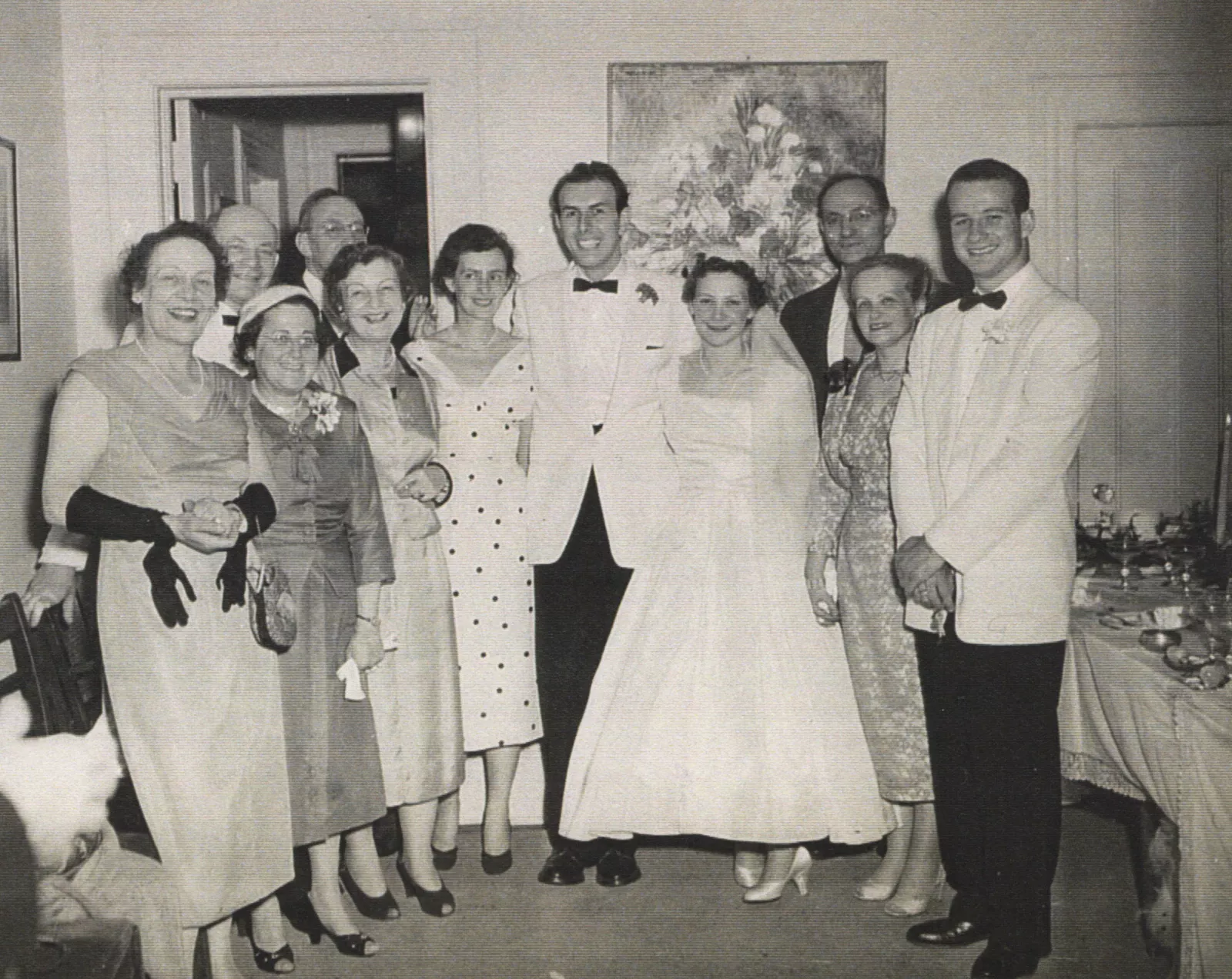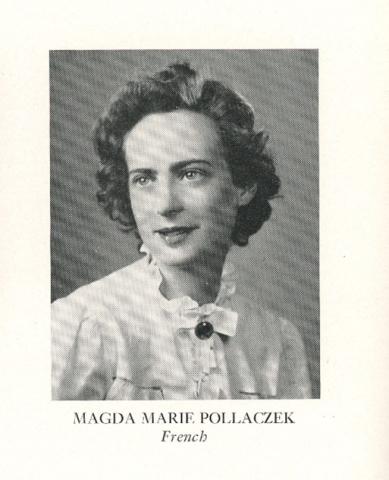Magda Tisza '43
Language Teacher, Translator, and Rare Book Dealer
In 1940, in the middle of World War II, Magda Tisza (July 6,1922, Vienna–Oct. 12, 2020, Auburndale, Mass.), née Pollaczek, came to study at Bryn Mawr College after her mother, Hilda Pollaczek-Geiringer, a high-caliber mathematician and statistician and one of the first women to receive a Ph.D. in mathematics from the University of Vienna, was hired to teach in the Department of Mathematics. Geiringer lost her position at the University of Berlin in 1933 when the Nazis prohibited Jews from being employed at public institutions. She worked for a year in Brussels and then for five years in Istanbul (1934–1939). After Atatürk’s death in 1938, the situation became precarious for Jews in Turkey. In that critical moment, Bryn Mawr College offered Geiringer a lecturer position, funded by grants of $1,200 from the Emergency Committee in Aid of Displaced Foreign Scholars and $600 from the Oberlaender Trust. Because the U.S. immigration law exempted professors and ministers from the restrictive quota system, the Bryn Mawr appointment enabled Geiringer to obtain a non-quota visa. Mother and daughter arrived in New York in November 1939.
Magda at Bryn Mawr
The chair of the Mathematics Department at the time, Professor Anna Pell Wheeler, welcomed Geiringer to Bryn Mawr College and helped her adapt to teaching at a small liberal arts institution. She also insisted that her daughter study for free at Bryn Mawr. Magda received a scholarship that covered tuition and housing. She majored in French because, as she said, “my English was only passable, and French was the easiest to do well.” Raised in Vienna and Berlin, Magda fit right in with the German Department, too. According to The College News (Vol. 28, No. 12), in mid-December 1941, the German Club presented the story of the Nativity, with interpolated German Christmas carols, in Goodhart Hall. Magda played an innkeeper's wife.
Magda’s financial situation was not comparable to that of many of her classmates, who came from affluent Main Line families in the suburban Philadelphia area. However, she never felt slighted or self-conscious about her situation. As a faculty child, Magda socialized with her mother’s students and also joined them in the classroom, earning a minor in statistics. She took on jobs in the library and babysat to help with expenses. During summers, she also worked as a camp counselor or audited courses while her mother spent time with her second husband, Richard Edler von Mises, in Cambridge, Mass. Geiringer had worked with von Mises in Berlin and again in Istanbul, and when they left in 1939, von Mises was invited to teach at Harvard.
Although anti-Semitism was prevalent on many American campuses at the time, at Bryn Mawr Magda felt “an enormous welcoming from a group of by and large high-class fellow students, and they were enormously curious about a German refugee.” She answered their many questions and also corrected misconceptions, such as the belief that German Jews danced on graves to celebrate Halloween. Most of Magda’s closer friends were Jewish. “Personally for me, I had the warmest reception,” she declared, but she also remembered what a Jewish friend said to her: “You have no idea how lucky you are. You haven’t experienced the American feeling about Jews.”
After Bryn Mawr
Magda’s foreign language skills were the foundation of her long and varied career. After graduating in 1943. she was hired to teach French for a year at Dana Hall, an all-girls school in Wellesley, Mass. She taught German at Dana Hall as well, but that was something she did not disclose to many people at the time because Germany was viewed as the enemy.
In 1944, however, Magda’s knowledge of German made her an asset to the research and development section of the Office of Strategic Services (OSS) in Washington, D.C. She wanted to return to Europe, and she was able to join the special OSS film team, headed by the famed Hollywood director John Ford. Ford arranged for Magda to go to Germany to scour film archives for pictorial evidence to be used against Nazi leaders who were soon to be tried at Nuremberg. The American chief prosecutor, Robert Jackson, employed the strategy of using the Nazis’ own records to indict them. In 2010, Magda was interviewed about her contributions to the 1948 documentary, Nuremberg: Its Lesson for Today (the interview is included in the 2014 DVD edition of the film). She was impressed by “the atmosphere of sincere soul-searching which prevailed among the Allied members of the Tribunal.” The fairness of the trial was taken very seriously.
The OSS closed down a few months after V-E Day (Victory in Europe Day on May 8, 1945), but Magda sought to prolong her stay in Europe. This time, her multilingualism earned her a post at the Office of War Information (OWI) in the Allied Occupation Government in Berlin, where she donned the uniform of a civil officer. She proudly recalls that she once interpreted for General Lucius D. Clay, the commander-in-chief of the U.S. Occupation Forces, who later directed the Berlin Airlift (1948–1949). When she returned to America, many of her Jewish neighbors voiced their opposition to all things German and said, for instance, that they would “never buy a Mercedes.” Magda was more tolerant, however, for she had seen the ruins of German cities and recognized the toll the war took on the German people.
While in Berlin, Magda visited Displaced Person camps and got to know some of the persons whose lives had been uprooted. In spring 1949, Magda participated in an exchange program and traveled to the newly formed State of Israel. Among the classes she took at the Hebrew University was a philosophy course with Martin Buber, who had left Nazi Germany in 1938 for Jerusalem.
Starting in the mid-1960s, Bryn Mawr alumnae/i would hold an annual three-day used book sale in Harvard's substantial Memorial Hall. In 1971, using the proceeds of these sales, they founded the Bryn Mawr Bookstore on Huron Avenue in Cambridge, Mass. The venture was so successful that they were soon able to purchase the building, and the bookstore remains in business 49 years later. Magda was one of the founders, managed the store for years, and continued to consult on their rare German items into her 90s.
Following the death of her first husband, Robert Buka, Magda became an instructor at MIT, where she taught French and German language and literature. There she met her late husband, Laszlo Tisza, an esteemed professor of physics and a Jewish refugee who had escaped to the U.S. from Hungary. After Magda remarried, she retired from teaching and, drawing on the expertise she acquired at the Bryn Mawr Bookstore, became a book dealer in her own right, specializing in German literature. Her stepfather, Richard von Mises, was a serious collector of Rainer Maria Rilke and shared with her the catalogs of rare books that arrived at their house. Magda Tisza Rare Books attested to her love of German literature and culture. She was never vengeful towards the Germans. As she said, she continues to value this culture that had long accepted Jews before one faction rejected them. She has a longer sense of history that transcends the experience of the 1930s.
What has Bryn Mawr meant for Magda?
Bryn Mawr College changed Magda’s life. It provided Hilda Geiringer and her daughter with a safe place to live in the U.S. when their lives in Europe were in peril. It gave Magda an excellent free education. Her multilingual skills enabled her to live a life filled with historic, transnational experiences, including assisting at the Nuremberg trials and working in the Allied Powers administration in postwar Berlin. The editors of Albert Einstein’s collected papers asked her to translate his earliest letters because she could read his gothic handwriting fluently. Magda said that the role languages played in her life was “enormous”: “I always thought the knowledge of foreign languages was very important. It was a vital aspect of my life.” In addition to German, French, and English, she learned some Turkish, Hebrew, and Spanish in the course of her life, but she remarked that “For myself, it was a very bad experience to be in each case exposed to the next language before I could speak the current one well.” Bryn Mawr was also a place where Magda made lifelong friends, and she returned to campus for her 40th reunion. When the Bryn Mawr Bulletin arrives, she reads it carefully. At 98, she still has vivid memories of her College days: “Those were happy years in my life!”
Author's Note: I am deeply saddened to learn that Magda passed away on Oct. 12, 2020, just before this article was published. I am grateful to Magda for the phone interview on Sunday, Sept. 20, 2020, and to her son, Steve Buka, for facilitating the conversation. Magda’s answers have been edited for succinctness.
Magda Marie Pollaczek, Interpreter at OWI, 1946
Published on: 10/22/2020

